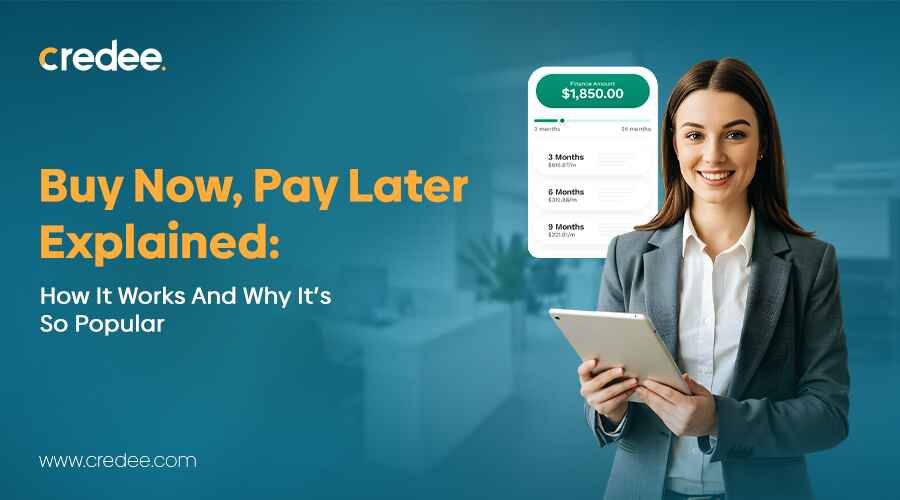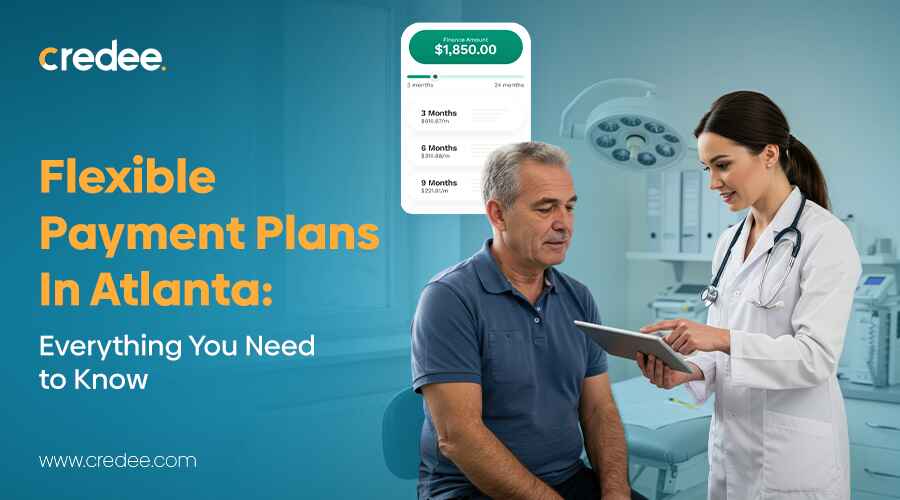
Buy Now, Pay Later (BNPL) has become one of the fastest-growing payment trends, reshaping how consumers shop and how businesses sell. In this blog, we answer the most common questions about BNPL how it works, who can use it, its impact on credit, and why it’s become a win-win solution for both customers and businesses. Whether you’re a business looking to offer flexible payments or a customer curious about how BNPL fits into your budget, this guide breaks it all down clearly and simply.
1. What Exactly Is Buy Now, Pay Later (BNPL), and How Does It Work?
Buy Now, Pay Later, or BNPL, is a flexible payment option that lets you make purchases without paying the full price immediately. Instead, you have the option to divide the total amount into a series of planned payments made over time. For example, a $1,000 purchase could be broken into twelve interest-free payments of $100 each.
BNPL lets customers make purchases immediately and pay them off gradually over time.
You’ll often see these services listed next to credit cards and other payment choices at checkout. To get started, shoppers simply choose a BNPL provider, sign in or set up an account, and select a repayment plan that works for their budget. The retailer receives the full payment upfront (minus any fees), while customers pay the installments directly to the BNPL provider. When payments are made on time, there are typically no extra fees or interest, making it an easy and transparent way to manage spending.
2. How Does BNPL Affect My Credit Score?
When you use Buy Now, Pay Later, most providers conduct a soft credit check, which doesn’t impact your credit score. Occasionally, a few companies might use a hard inquiry to assess eligibility, and that can cause a slight, short-term drop in your score.
The bigger risk comes with missed payments. If you miss payments, the BNPL provider might notify credit bureaus or turn your account over to collections, which could negatively affect your credit history in the long run.
3. What Fees or Interest Charges Should I Expect With BNPL?
Buy Now, Pay Later (BNPL) can be a genuinely affordable way to shop, as long as you stay on top of your payments. Most providers don’t charge any interest or fees if you pay on time, making it feel like a smarter, easier alternative to using a credit card. But the key is consistency. Here’s what you could face if you don’t pay on time or fail to settle your balance within the agreed timeframe:
- Late payment fees: These are the most common charges and can range from a few dollars to a small percentage of the installment. It may appear minor at first, but missing several payments can cause the charges to accumulate rapidly.
- Interest charges: Some BNPL plans, especially those with longer repayment terms, start adding interest after an introductory “no-interest” period ends, or when a payment is missed.
- Returned payment fees: If your account doesn’t have enough funds when a payment is due, your provider may charge a fee for the failed transaction.
- Merchant fees (for businesses): On the business side, retailers usually pay a small percentage or flat fee per transaction to the BNPL provider. It’s similar to what they’d pay for processing a credit card payment, and it helps cover the cost of offering flexible payment options.
| Did you know? Nearly 1 in 4 Americans have used a Buy Now, Pay Later (BNPL) service in the past year. Source: Investopedia |
4. Who Is Eligible for BNPL Financing?
Buy Now, Pay Later (BNPL) services are designed to be simple and widely accessible, but there are still a few basic requirements you’ll need to meet before you can use them. These criteria allow providers to verify your identity and handle the repayment plan responsibly.
Eligibility Requirements:
- Age: Applicants must be at least 18 years old to qualify.
- Location: A valid U.S. phone number is needed to confirm your account.
- Identification: Certain providers might ask for your Social Security Number (SSN) to perform a brief credit check before approving.
- Payment Method: A valid credit or debit card or another accepted payment option is required to make your scheduled payments.
5. Can BNPL Be Used for All Types of Purchases?
Buy Now, Pay Later (BNPL) isn’t limited to retail shopping anymore. It’s quickly becoming a flexible way to pay for a wide range of products and services. While availability depends on the merchant and the BNPL provider they work with, it’s now used across many everyday and essential categories.
You can typically use BNPL for retail purchases such as clothing, electronics, home goods, and beauty products. What’s particularly interesting is that this payment approach is now making its way into service-oriented industries too. With platforms like Credee, consumers can now access BNPL for services in dental care, cosmetic surgery, home improvement, healthcare, education, and more, making big expenses easier to manage without upfront financial strain.
6. How Does BNPL Benefit Businesses?
Buy Now, Pay Later (BNPL) has evolved from a trendy payment option into a proven growth strategy for modern businesses. It not only makes purchasing easier for customers but also gives merchants powerful tools to boost revenue, improve cash flow, and strengthen customer loyalty all without added financial risk.
When businesses offer BNPL through trusted providers like Credee, they get the best of both worlds: flexible payment options for customers and a steady monthly income for their business. Credee’s model is built around stability and trust, featuring a 97% approval rate, payment protection that ensures you continue to receive revenue even if customers miss or delay payments, and efficient debt recovery so your operations stay smooth and stress-free.
Here’s how BNPL benefits businesses:
- More sales and higher conversions: Many customers hesitate to buy big-ticket items all at once. With BNPL, that hesitation drops, and customers are more likely to complete their purchase instead of abandoning their cart.
- Higher average order value (AOV): When people can pay over time, they tend to treat themselves a little more, adding that extra item or upgrading to the better version, leading to larger transactions.
- Less financial risk: The BNPL provider manages customer approvals, payment collections, and overdue accounts, allowing businesses to avoid the hassle of tracking down late payments.
- Access to new customers: BNPL is especially popular with younger shoppers and those without credit cards, opening the door to a wider customer base that might otherwise skip the purchase.
- Instant cash flow: Because the BNPL provider pays the business upfront, there’s no waiting for payments to trickle in funds are available immediately.
- Simplified checkout experience: BNPL adds convenience at the final step of the buying journey, which makes the entire shopping experience feel smoother and more customer-friendly.
7. How Secure Is BNPL for Both Consumers and Businesses?
Buy Now, Pay Later (BNPL) is rapidly becoming a go-to payment option worldwide, offering convenience for consumers and higher sales for businesses. Still, questions about security often arise. The truth is, BNPL can be very secure, provided you choose a trusted provider and understand how it protects both buyers and merchants.
➡ How Secure Is BNPL for Consumers?
Buy Now, Pay Later is generally a safe payment option, but how secure it truly depends on two things: the provider you choose and how carefully you manage your account.
1. Data protection:
Leading BNPL providers use strong encryption and modern security systems to safeguard your personal and financial information, much like the protections used by traditional banks. That means your information is typically well protected, though it’s always smart to stick with trusted, established providers.
2. Fraud prevention:
BNPL providers continuously track transactions for unusual activity and typically require identity verification before confirming a purchase. Still, because signing up is so quick and easy, there’s a small chance of fraud if someone gets hold of your details. Keeping your login secure and watching for strange activity is a good habit.
3. Credit impact:
Security isn’t just about your data; it’s also about your financial health. Missing a payment can affect your credit score if your BNPL provider reports it to credit bureaus. Staying organized and paying on time keeps both your score and your reputation intact.
➡ How Secure Is BNPL for Businesses?
For businesses, BNPL can be a powerful way to boost sales and attract new customers but it also comes with a few things to consider.
1. Upfront payments:
The good news is that most BNPL providers pay merchants immediately after a customer’s purchase, so you get your money upfront. The provider takes on the risk of collecting payments later, giving you a steady cash flow and fewer chargeback headaches.
2. Fraud reduction:
Leading BNPL platforms use smart fraud detection technology, which helps flag suspicious transactions and keeps fake or stolen card activity to a minimum.
3. Data security and compliance:
Well-established providers follow strict privacy and financial regulations, ensuring that customer information is handled securely and in line with industry standards.
4. Reputation management:
Not every BNPL provider is built the same. Partnering with an unreliable provider can lead to customer service issues that negatively impact your business’s reputation.
8. How Do I Handle a Missed Payment Under a BNPL Plan?
Missing a Buy Now, Pay Later (BNPL) payment can have different outcomes depending on the provider, so it’s always a good idea to check the terms before signing up. Each business handles missed payments differently, but there are a few common consequences to be aware of.
Falling behind could result in late fees or added interest on what you still owe. If payments continue to go unpaid, your account may even be turned over to collections, which can affect your credit standing. Some providers may also suspend your access to future BNPL purchases until your account is brought back to good standing.
In short, missing a payment doesn’t just delay things; it can affect your ability to use the service again and may even hurt your credit if it goes too far. If you can’t make a payment, contact the provider early; many offer brief grace periods or flexible options to help you catch up.
9. How Does BNPL Compare to Traditional Credit or Financing Options?
Buy Now, Pay Later (BNPL) has changed how people approach financing, especially for smaller or everyday purchases. While traditional credit cards and loans have long been the go-to options for spreading payments, BNPL offers a simpler, more transparent way to buy what you need without long-term debt commitments.
Credee makes it easier for businesses to offer flexible payment plans while helping customers manage their budgets responsibly.
Here’s how BNPL compares to traditional financing options:
| Aspect | Buy Now, Pay Later (BNPL) | Traditional Credit / Financing |
|---|---|---|
| Approval Process | Quick and easy often done instantly at checkout with minimal checks. | Usually requires a detailed credit application and a hard credit inquiry. |
| Credit Check | Typically, a soft or no credit check. Credee offers no credit check financing, so approvals don’t affect your score. | Involves a hard credit pull, which can temporarily lower your credit score. |
| Interest & Fees | Most short-term BNPL plans are interest-free if payments are made on time. Late fees may apply if payments are missed. | Usually includes ongoing interest rates and possible annual or late fees. |
| Payment Structure | Split into equal installments (e.g., four payments over six weeks). | Payments vary by interest rate and balance; repayment terms can extend for months or years. |
| Ease of Use | Integrated directly at checkout simple and fast. | Requires applying for a credit card or loan separately before purchase. |
| Impact on Credit | May not build credit unless reported by the provider; late or missed payments could be reported. | Builds credit history when managed responsibly, but can harm scores if misused. |
| Best For | Customers looking for flexibility, especially for smaller or one-time purchases. | Larger or recurring expenses that need long-term financing. |
10. How Does a BNPL Transaction Work?
Buy Now, Pay Later (BNPL) makes it easy for people to get what they want right away and pay for it over time, often without interest if they stay on schedule. At checkout, customers simply choose the BNPL option, and the provider covers the cost for the merchant upfront. The customer then repays the provider in a series of fixed installments, usually drawn automatically from a linked debit or credit card. Missing a payment can lead to interest charges, late fees, and potentially a hit to the customer’s credit score.
Here’s how the BNPL process typically works:
- Choosing BNPL at checkout: At checkout, the shopper picks the BNPL option, much like choosing a credit card for payment.
- Merchant receives payment: The BNPL provider sends the full purchase amount to the merchant immediately, minus a small transaction fee.
- Repaying the provider: The buyer then pays back the BNPL provider over a set period. Payments are usually divided into equal installments, with the first often due at the time of purchase.
- Installment schedule: The remaining installments are spread over several weeks or months and are automatically charged to the customer’s chosen payment method.
- Managing interest and fees: Most plans are interest-free if payments are made on time. Late payments, however, can trigger fees and interest, and repeated missed payments may affect the customer’s credit score.
11. What Is the Catch with Buy Now Pay Later?
While Buy Now, Pay Later (BNPL) can feel like a convenient way to make purchases more manageable, it’s not without its downsides. Here are a few risks to consider before clicking “Pay Later.”
A) It Can Encourage Overspending
When payments are split into smaller chunks, big purchases suddenly feel more “affordable.” That can make it tempting to add just one more thing to your cart. Before you know it, you’ve committed to multiple payment plans—and a much bigger bill than you planned for.
B) Your Credit Score Could Take a Hit
A few years ago, BNPL didn’t impact your credit. Now, many providers report missed payments to credit bureaus. Even one slip-up can lower your score and make it harder to qualify for things like car loans or mortgages later on.
C) It’s Easy to Lose Track of Payments
With multiple BNPL accounts across different retailers, keeping up with payment dates can become a juggling act. One missed reminder can lead to a cascade of late fees and a growing pile of debt that’s tough to manage.
D) “Interest-Free” Isn’t Always Free
BNPL deals often advertise zero interest, but that perk disappears the moment you miss a payment. Late fees can kick in, and some providers start charging steep interest rates that rival credit cards. The key is consistency—miss one payment, and it could get expensive fast.
E) You Might Not Have the Same Protections
Credit cards often come with built-in safeguards if something goes wrong, such as Section 75 protection in some regions, which covers you if your item never arrives or is faulty. BNPL plans don’t always offer that same safety net, so resolving disputes can be trickier.
12. Does BNPL Affect Your Credit Score?
The answer isn’t as simple as yes or no. It depends on how you use it and which provider you choose. Let’s break down how these plans can help—or hurt—your credit health.
A) Credit checks:
Some BNPL companies perform a soft credit check (which doesn’t affect your score), while others might do a hard check if you’re applying for higher limits. A hard inquiry can cause a small, temporary dip in your credit score. Credee, for example, offers no credit check financing, making it easier for customers to get approved without worrying about their credit being impacted
B) Missed or late payments:
If you miss payments, many BNPL providers now report that information to credit bureaus. A single late or missed installment could lower your credit score, similar to missing a credit card payment.
C) Building a credit history:
On the flip side, consistently paying on time can help demonstrate responsible borrowing. However, not all BNPL providers report positive payment behavior, so the benefit depends on the company.
D) Multiple active BNPL plans:
Opening several BNPL accounts at once can raise red flags for lenders, suggesting that you might be overextending yourself. That can indirectly affect your ability to qualify for loans or new credit later.
13. Does Buy Now Pay Later Hurt Your Credit?
It can, if you’re not careful. Buy Now, Pay Later (BNPL) plans might seem like a harmless way to stretch your budget, but they can impact your credit score depending on how you manage them. Here are a few ways it can influence your credit:
1. Late or Missed Payments:
Falling behind on a payment is one of the quickest ways to damage your credit. Even a single missed installment can leave a mark on your credit report and lower your score for months to come.
2. Rising Credit Usage:
If a lender views your BNPL activity as part of your revolving credit, carrying multiple payment plans at once could raise your credit utilization ratio. A higher ratio signals potential risk to lenders and can drag your score down.
3. Growing Impact of Reporting:
As more BNPL companies begin sharing data with credit bureaus, your payment behavior matters more than ever. Consistent late payments can build a negative record over time, slowly eroding your credit standing.
Wrapping Up
Buy Now, Pay Later (BNPL) has completely changed the way people shop and how businesses operate. It’s made flexible financing easy, fast, and more accessible than ever. It’s no surprise that so many consumers love it as they get to spread out payments without extra interest, while businesses enjoy higher sales and quick, guaranteed payouts.
Still, BNPL isn’t something to use carelessly. Like any financial tool, it works best when you stay on top of payments and understand the terms before committing. Choosing a reliable provider can make all the difference. For example, businesses that partner with trusted platforms like Credee gain more than just flexible payment options - they build stronger customer relationships and enjoy smoother cash flow.
At its core, BNPL is about more than just delaying payment. It’s about creating financial breathing room, building trust between buyers and sellers, and making shopping more inclusive for everyone. Used wisely, it can truly benefit both sides, helping consumers manage expenses and giving businesses a simple way to grow sustainably.





